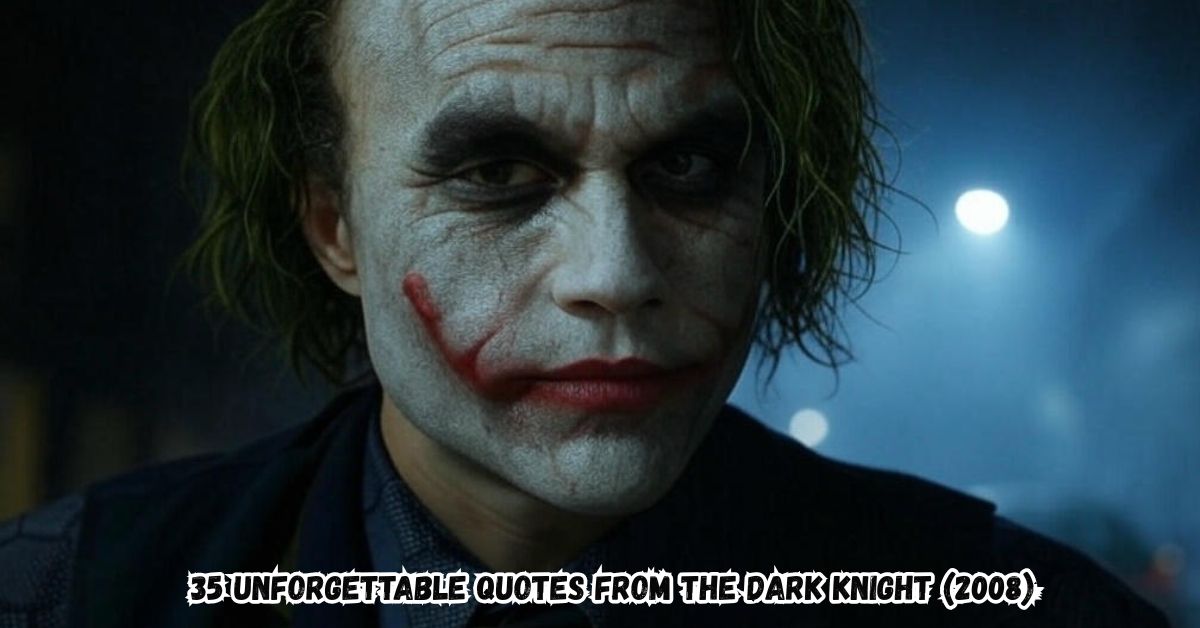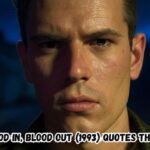The Dark Knight stands as Christopher Nolan’s masterpiece. Every scene delivers powerful dialogue. Heath Ledger’s Joker performance changed cinema forever. The film won two Oscars and reshaped superhero movies entirely.
Its philosophical depth transcends typical comic book adaptations.Batman faces his greatest enemy in Gotham City. Heroes fall. Villains rise. Moral boundaries blur. The dialogue captures this psychological struggle perfectly.
The Dark Knight (2008): A Revolutionary Cinematic Experience
The Dark Knight transformed superhero cinema in 2008. Christopher Nolan created more than entertainment he crafted art. The film explores ethics, corruption, and human nature through unforgettable characters.
Batman represents order. The Joker embodies chaos. Harvey Dent shows how easily heroism can transform into villainy. Their words reveal deeper truths about society and ourselves.
Heath Ledger’s iconic Joker performance won him a posthumous Academy Award. His dialogue delivery remains unmatched. Christian Bale’s Batman provides the perfect counterbalance. Together, they create tension that drives the entire story.
The film earned over $1 billion worldwide. Critics praised its psychological depth. Audiences connected with its complex characters. The American Film Institute ranks it among history’s greatest films.
Iconic Quotes from The Dark Knight (2008)
These lines transcend the screen. They’ve entered our cultural vocabulary. Each quote reveals character motivation and explores deeper themes of justice, duality, and sacrifice.
The dialogue moves beyond typical superhero fare. It challenges viewers to question their own beliefs. These quotes capture the essence of Nolan’s trilogy at its best.
1. “Why so serious?” The Joker
The Joker’s signature line echoes through popular culture. Heath Ledger delivered it with a chilling effect. The phrase captures the villain’s nihilistic worldview perfectly.
This line appears during his scar story. Each telling reveals different psychological layers. The question mocks society’s structured norms. It represents the Joker’s rejection of order itself.
2. “You either die a hero, or you live long enough to see yourself become the villain.” Harvey Dent
Harvey’s words foreshadow his tragic fate. The transformation from hero to villain defines his character arc. This quote explores the thin line between righteousness and corruption.
Gotham’s “White Knight” speaks unwitting truth. His idealism eventually shatters. The quote remains relevant in discussions about power and moral compromise.
3. “Introduce a little anarchy. Upset the established order, and everything becomes chaos.” The Joker
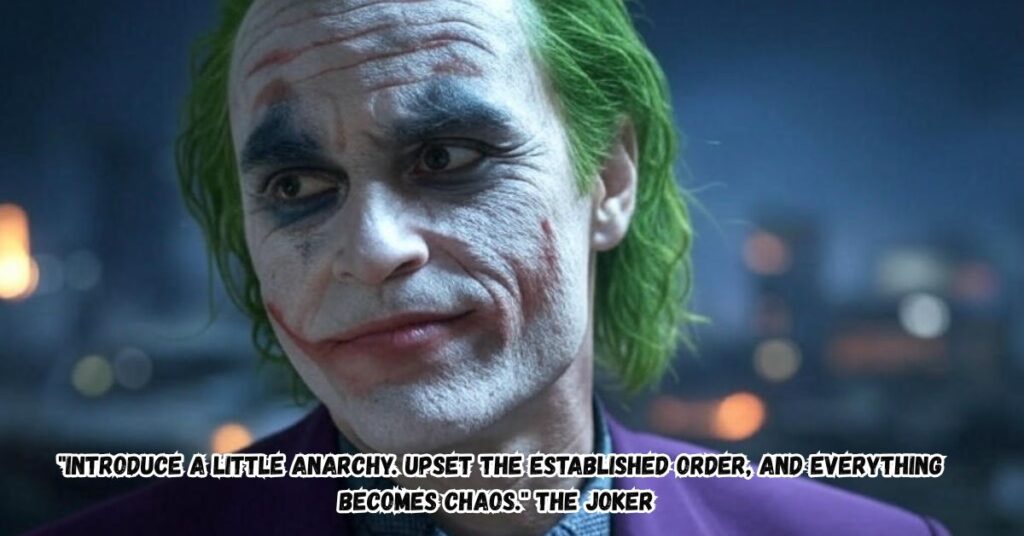
The Joker articulates his mission statement perfectly. His goal extends beyond simple crime. He wants to prove that order is merely an illusion.
This philosophy drives every action he takes. He targets social institutions deliberately. The line reveals why the Joker represents such a unique threat to Gotham.
4. “It’s not about money. It’s about sending a message.” The Joker
Unlike traditional criminals, the Joker’s motivations transcend material gain. This quote emerges as he burns millions in cash. His actions serve a twisted philosophical purpose.
The message matters more than money. The Joker wants to reveal society’s fragility. His actions force characters to confront uncomfortable truths about human nature.
5. “I’m not a monster. I’m just ahead of the curve.” The Joker
The Joker sees himself as a visionary, not a villain. This statement reveals his disturbing self-perception. He believes everyone shares his capacity for chaos.
His worldview suggests civilization merely masks our true nature. The line highlights the Joker’s most frightening quality: his twisted logic makes sense sometimes.
6. “The night is darkest just before dawn. And I promise you, the dawn is coming.” Harvey Dent
Harvey offers hope to Gotham’s citizens. His optimism contrasts sharply with the city’s bleak reality. The irony becomes apparent with his later transformation.
This inspirational message later gains tragic significance. The “dawn” arrives, but not as anyone expected. Dent’s fall mirrors Gotham’s broken promises.
7. “I believe whatever doesn’t kill you simply makes you… stranger.” The Joker
The Joker twists Nietzsche’s famous quote. The original suggests adversity strengthens character. The Joker’s version reflects his own disturbed worldview.
This line appears early during the bank robbery. It establishes the Joker’s psychological framework immediately. His perspective never values growth only increasing chaos.
8. “I’m Batman.” Batman/Bruce Wayne
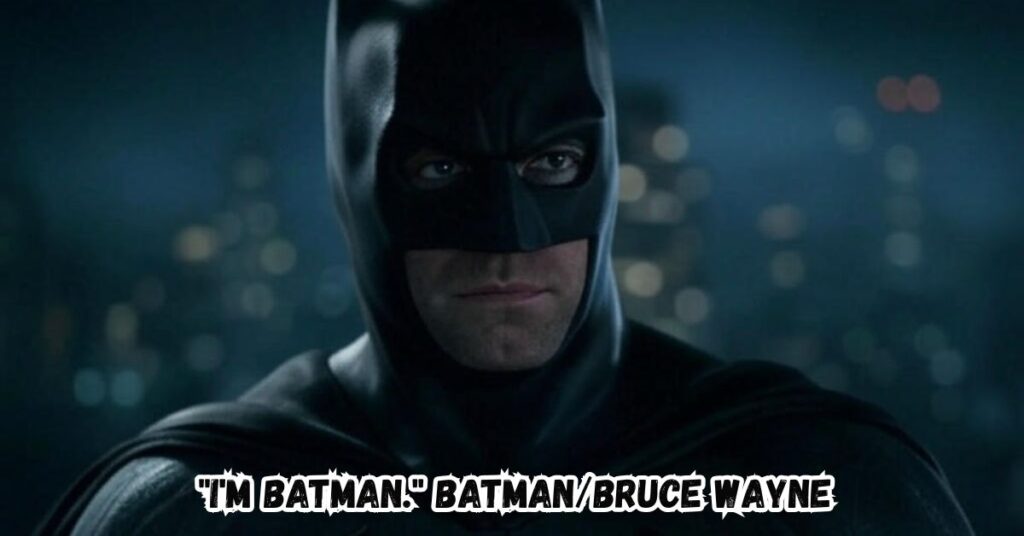
Simple yet powerful. Batman’s self-identification carries immense weight. The statement represents his complete embrace of his vigilante identity.
Bruce Wayne disappears behind the mask completely. The line appears in multiple Batman films. In Nolan’s trilogy, it signifies acceptance of personal sacrifice for Gotham’s protection.
9. “Some men just want to watch the world burn.” Alfred Pennyworth
Alfred provides crucial insight into the Joker’s mindset. This observation reveals the limitation of rational responses. Some villains defy logical understanding.
The butler’s wisdom comes from direct experience. His anarchy analogy helps Batman comprehend his enemy. The quote perfectly captures the Joker’s pure destructive impulse.
10. “This is what happens when an unstoppable force meets an immovable object.” The Joker
The Joker recognizes his perfect opposition in Batman. Their conflict represents fundamental forces in collision. Neither can truly defeat the other.
This metaphor extends beyond physical confrontation. Batman’s rigid morality clashes with the Joker’s absolute chaos. Their battle represents eternal philosophical struggle.
READ MORE THIS BLOG : 27 Inspirational Quotes About Life and Struggles to Keep You Going
11. “You thought we could be decent men in an indecent time! But you were wrong. The world is cruel, and the only morality in a cruel world is chance.” Two-Face
Harvey’s descent into Two-Face culminates in this bitter declaration. His idealism shatters completely. Random chance replaces his former belief in justice.
This quote marks his complete transformation. The coin becomes his moral arbiter. Two-Face embodies disillusionment with society’s systems and structures.
12. “Madness, as you know, is like gravity. All it takes is a little push.” The Joker
The Joker suggests sanity remains fragile for everyone. This perspective informs his efforts to corrupt Harvey Dent. He sees madness as humanity’s natural state.
His success with Harvey proves his point disturbingly. The “push” represents trauma’s power to reshape identity. This quote reveals the Joker’s understanding of psychological vulnerability.
13. “I’m whatever Gotham needs me to be.” Batman/Bruce Wayne
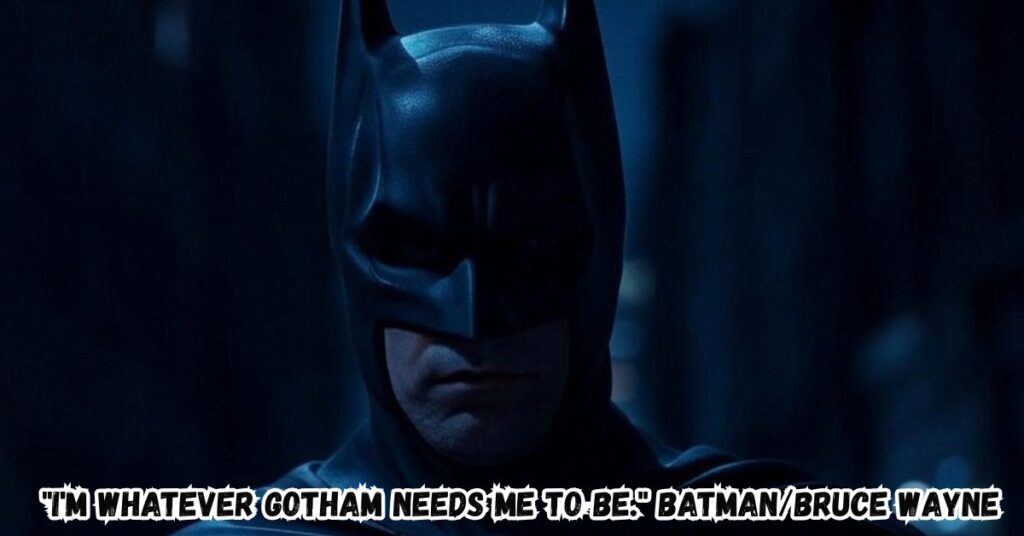
Batman accepts his fluid symbolic role. He prioritizes Gotham’s needs above personal reputation. This sacrifice defines his heroism uniquely.
This line appears as he accepts blame for Harvey’s crimes. He embraces vilification willingly. The statement perfectly captures Batman’s selfless commitment to Gotham.
14. “A hero can be anyone.” Batman/Bruce Wayne
Bruce recognizes heroism’s universal potential. This democratization of heroism extends beyond costumes and gadgets. Ordinary citizens can demonstrate extraordinary courage.
The statement affirms Batman’s faith in humanity. Despite witnessing Gotham’s darkness, he believes in people’s capacity for good. This optimism contrasts with the Joker’s cynicism.
15. “You were right about him. You were always right.” Gordon
Gordon acknowledges Batman’s foresight regarding Harvey Dent. This admission demonstrates how situations forced difficult choices. Even good men faced impossible decisions.
The line shows mutual respect between Gordon and Batman. Their partnership rests on shared understanding. Both recognize the compromises necessary for Gotham’s protection.
16. “It’s not who I am underneath, but what I do that defines me.” Batman/Bruce Wayne
Batman articulates his action-based identity. This philosophy prioritizes behavior over internal characteristics. It represents his commitment to active heroism.
The mask doesn’t create the hero actions do. This perspective contradicts typical identity understanding. Batman sees himself defined through choices, not circumstances.
17. “Endure, Master Wayne. Take it. They’ll hate you for it, but that’s the point of Batman, he can be an outcast.” Alfred Pennyworth
Alfred offers wisdom during Bruce’s darkest moment. He reminds Batman that unpopularity sometimes accompanies right action. The hero’s burden includes social rejection.
This guidance reinforces Batman’s unique position. Unlike Harvey Dent, he can absorb public hatred. His sacrifice includes reputation itself.
18. “You crossed the line first, sir. You squeezed them, you hammered them to the point of desperation. And in their desperation, they turned to a man they didn’t fully understand.” Alfred Pennyworth
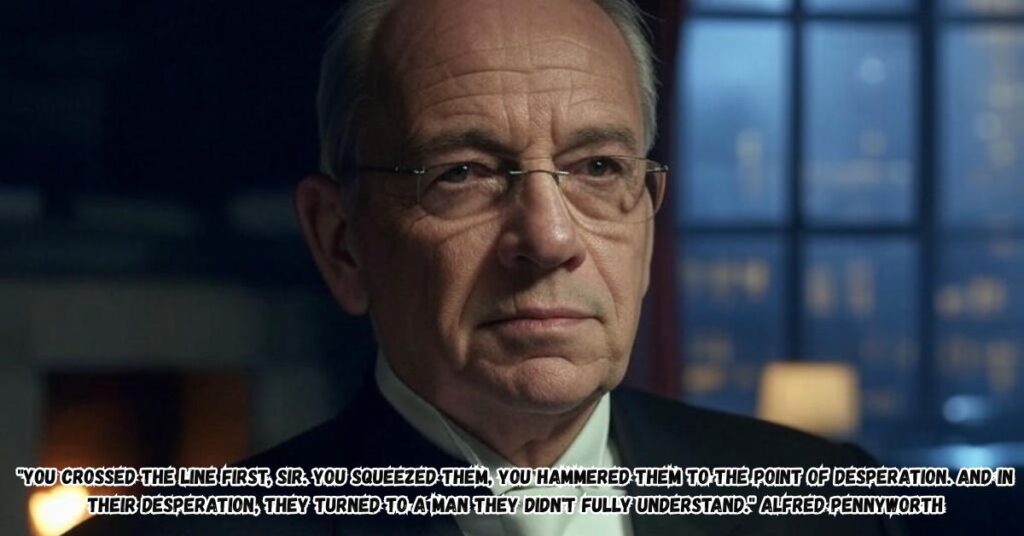
Alfred provides a crucial perspective on the Joker’s emergence. He suggests Batman’s aggressive tactics produced unintended consequences. Actions create reactions, even with good intentions.
This observation introduces accountability. Batman must recognize his role in escalation. Alfred’s wisdom forces Bruce to confront his methods’ implications.
19. “You can’t rely on anyone these days, you gotta do everything yourself. Don’t we?” The Joker
The Joker’s cynical observation carries dark humor. His rhetorical question invites uncomfortable agreement. The line appears during his chaotic hospital scheme.
This sentiment reflects his misanthropic worldview. He sees collaboration as fundamentally flawed. The statement serves his narrative that society lacks true order.
20. “If you’re good at something, never do it for free.” The Joker
The Joker applies twisted business logic to criminality. This pragmatic statement contradicts his apparent chaos. It reveals calculated thinking beneath unpredictable behavior.
READ MORE THIS BLOG : 100+ Good Afternoon Messages for Someone Special (2025 Guide)
He delivers this line to mob bosses during negotiation. The professional attitude unsettles criminals accustomed to predictable enemies. The quote hints at the Joker’s complex motivations.
21. “You complete me.” The Joker
The Joker recognizes his symbiotic relationship with Batman. This disturbing romantic comedy reference gains new meaning. It suggests their conflict creates mutual definition.
Without Batman, the Joker loses purpose. Without the Joker, Batman lacks ultimate challenge. Their opposition creates strange interdependence. The quote perfectly captures their twisted connection.
22. “I’m an agent of chaos. And you know the thing about chaos? It’s fair.” The Joker
The Joker articulates his twisted philosophy directly. He sees himself as chaos personified. His belief that randomness equals fairness reveals his disturbed perspective.
This statement appears during Harvey’s corruption. The Joker presents chaos as democratic, affecting everyone equally. This perverse equality appeals to Harvey’s shattered sense of justice.
23. “Do I really look like a guy with a plan?” The Joker
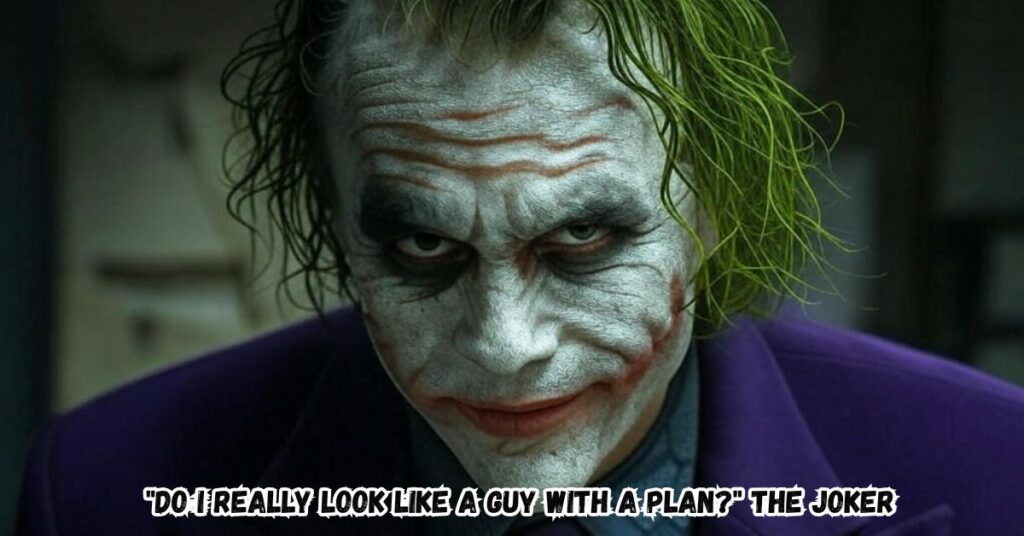
The Joker’s disingenuous question misleads intentionally. Despite claiming spontaneity, his actions show precise calculation. The contradiction demonstrates his manipulative nature.
This line appears during his hospital conversation with Harvey. The statement deflects responsibility while maintaining influence. His apparent randomness masks methodical corruption.
24. “Sometimes the truth isn’t good enough, sometimes people deserve more. Sometimes people deserve to have their faith rewarded.” Batman/Bruce Wayne
Batman recognizes truth’s limitations. This statement justifies his final deception. He prioritizes Gotham’s hope above absolute honesty.
This philosophy directly opposes the Joker’s destructive truth-telling. Batman chooses noble falsehood over devastating honesty. The quote explains his controversial final decision.
25. “You and I are destined to do this forever.” The Joker
The Joker acknowledges his eternal battle with Batman. This statement recognizes their perpetual opposition. Neither can truly eliminate the other.
This quote carries meta-textual significance. Batman and Joker have fought across comics, films, and media for decades. Their conflict represents fundamental forces in perpetual tension.
26. “You have nothing, nothing to threaten me with. Nothing to do with all your strength.” The Joker
The Joker reveals Batman’s tactical limitations. Physical intimidation fails against someone without fear. This observation highlights why conventional methods prove ineffective.
Batman faces a unique challenge in the Joker. Force cannot solve this problem. The quote demonstrates why the Joker represents Batman’s ultimate test.
27. “Because he’s the hero Gotham deserves, but not the one it needs right now.” Gordon
Gordon articulates Batman’s complex relationship with Gotham. This paradoxical statement explains their final deception. Batman accepts vilification for greater good.
The distinction between “deserves” and “needs” reveals situational ethics. Sometimes circumstances demand imperfect solutions. This quote perfectly captures Batman’s sacrifice.
28. “We’ll hunt him, because he can take it.” Gordon
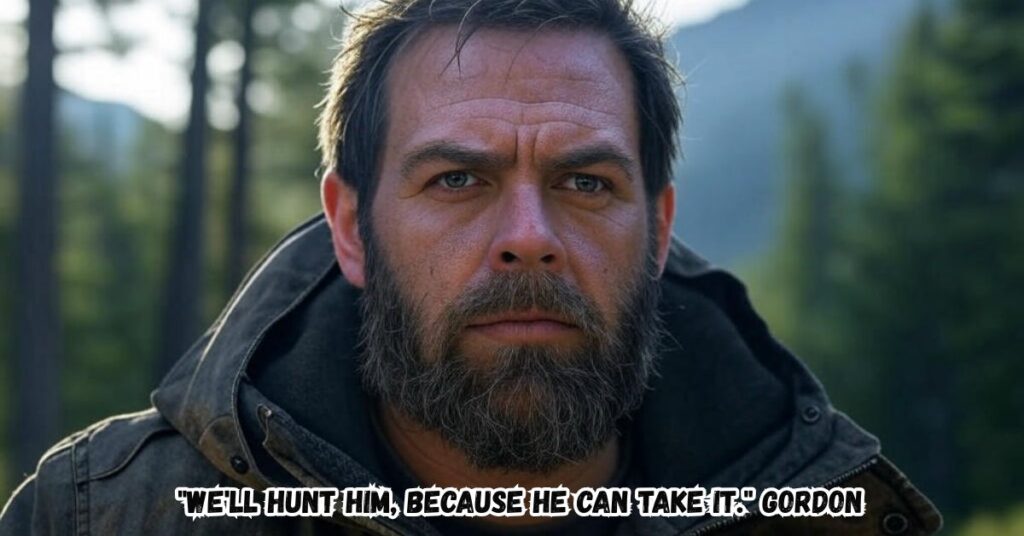
Gordon acknowledges Batman’s unique capacity for burden-bearing. This statement follows directly from the previous quote. Batman’s strength includes absorbing undeserved blame.
The “hunt” represents deliberate persecution. Batman accepts this punishment willingly. The quote demonstrates why Batman transcends conventional heroism.
29. “He’s not being a hero. He’s being something more.” Gordon
Gordon recognizes Batman’s transcendent role. Conventional heroism proves insufficient. Batman must exceed normal boundaries to save Gotham.
This observation appears during the film’s conclusion. It acknowledges Batman’s exceptional sacrifice. The statement defines what makes Batman unique among heroes.
30. “The Joker cannot win. Gotham needs its true hero.” Batman/Bruce Wayne
Batman remains determined despite overwhelming odds. This declaration reveals his unwavering commitment. Gotham’s welfare supersedes personal concerns.
The “true hero” reference carries irony. Batman knows he must falsely villainize himself. His commitment to Gotham overshadows individual recognition.
31. “The criminals in this town used to believe in things. Honor. Respect.” Sal Maroni
Maroni laments changing criminal landscapes. Traditional organized crime followed certain rules. The Joker represents something fundamentally different.
This observation highlights generational criminal shifts. Old systems maintain twisted ethics. The Joker’s pure chaos threatens even criminal structures.
32. “I knew the mob wouldn’t go down without a fight. But this is different. They crossed the line.” Gordon
Gordon distinguishes between conventional crime and terrorism. He recognizes fundamental differences in threat types. The Joker represents unprecedented danger.
This statement acknowledges escalation. Gotham faces something beyond normal criminal activity. The observation shows Gordon’s understanding of their unique challenge.
33. “Batman has no limits.” Bruce Wayne
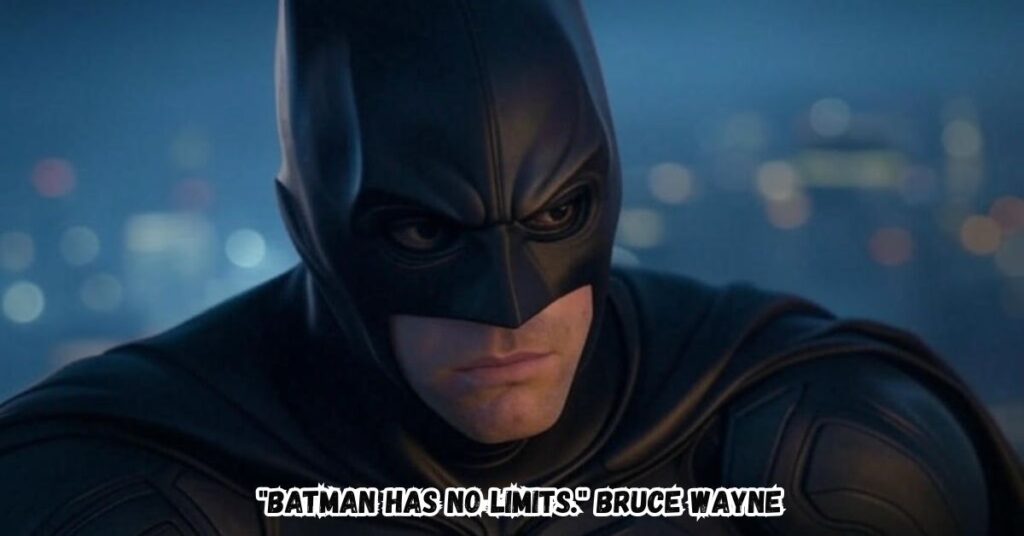
Bruce states his absolute commitment dramatically. This declaration reveals Batman’s dangerous potential. Nothing restricts his pursuit of justice.
The statement contains warning alongside boasting. Batman’s limitlessness includes moral hazard. This quote foreshadows ethical compromises throughout the film.
34. “I make my own luck.” Harvey Dent
Harvey’s confident assertion represents his pre-fall personality. He believes in personal agency and control. The statement contrasts sharply with his later coin-flipping fatalism.
This quote establishes Harvey’s initial character. His belief in self-determination defines him. The line’s irony becomes apparent after his transformation.
35. “Sometimes the right choice is the hardest one.” Alfred Pennyworth
Alfred distills ethical complexity into simple wisdom. This observation acknowledges moral difficulty. Right actions often demand greatest sacrifice.
This philosophy guides Batman throughout the film. His hardest choices prove most necessary. Alfred’s wisdom provides a framework for impossible decisions.
Frequently Asked Question
What makes Heath Ledger’s Joker quotes so memorable?
Ledger’s unique delivery combined with exceptional writing creates unforgettable moments. His physical performance amplifies each line. The Joker’s nihilistic philosophy challenges viewers directly. Ledger disappears completely into the character.
Which quote best captures the film’s central theme?
“You either die a hero, or you live long enough to see yourself become the villain” encapsulates the entire narrative. This line explores duality and moral compromise. Harvey Dent’s journey proves this statement tragically accurate.
How did these quotes influence later superhero films?
The Dark Knight’s dialogue elevated comic book films permanently. Later movies adopted similar philosophical depth. Villains became more complex and articulate. Heroes faced genuine moral dilemmas.
Why does Alfred have so many powerful quotes?
Alfred represents wisdom and moral clarity. His life experience provides a crucial perspective. Michael Caine delivers each line with perfect emotional weight. Alfred sees situations objectively without emotional attachment.
How do these quotes relate to real-world situations?
The quotes explore universal themes of justice, chaos, and human nature. Political leaders reference them in speeches. The lines appear in academic discussions about ethics and society. People apply them to personal moral dilemmas.
Conclusion
The Dark Knight’s dialogue transcends typical superhero fare. These quotes explore psychological depth rarely seen in the genre. They question fundamental assumptions about morality, justice, and human nature.
Christopher Nolan created characters whose words resonate years later. The philosophical questions remain eternally relevant. Batman’s struggle against chaos represents timeless conflict. The Joker’s disturbing insights force uncomfortable self-examination.
These quotes continue influencing cinema, literature, and even politics. Their cultural impact extends far beyond entertainment. The lines explore fundamental human questions through compelling characters. The dialogue achieves what great art always does; it makes us think while entertaining us completely.

Bolt is a seasoned SEO expert with a passion for content writing, keyword research, and web development. He combines technical expertise with creative strategies to deliver exceptional digital solutions.
